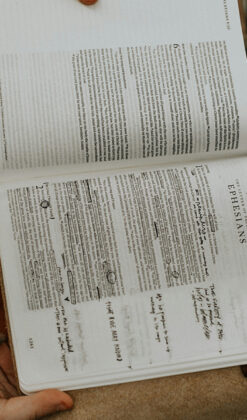
The Gospel Coalition just published a review of my two books, People to Be Loved and Living in a Gray World. The author of the review was Anne Paulk. As a writer, I enjoy good, constructive criticism of my work, and I’m so thankful to have people in my life who give it to me. Since I’m not Jesus, everything I say contains a mixture of truth and error, and I’m on a mission to weed out the latter.
This is why I rarely respond to critical reviews of my books. It could look rather defensive if you do. Plus, who has the time? It’s tough enough to write a book; to respond to its critics would require that I quit my day-job. But it’s difficult not to respond to Paulk’s review. Again, I’m totally fine if someone represents what I say accurately and then disagrees with what I say—preferably by providing evidence. But misrepresenting someone’s work is never helpful especially when people are reading reviews to get an honest idea about the book’s content.
I knew the review wasn’t going to be very accurate when Paulk began by saying that I live in Spokane, WA. I’ve heard that Spokane is a beautiful this time of year. It has lush forests and breathtaking mountain ranges. But don’t take my word for it. This is all hearsay. I’ve never even visited Spokane. [Update: the reference to Spokane has now been deleted from the review.]
I sort of chuckled at the mistake; it’s just a mistake and I take no offence at it. But this level of misrepresentation is reflected in the rest of Paulk’s review of my book. Here are some brief examples.
I found the review to be terribly unbalanced. The bulk of my book is an in-depth look at what the Bible says about same-sex sexual behavior. I spent thousands of hours researching the Old Testament, Mesopotamian and Egyptian sexuality, same-sex relations in Greco-Roman and Jewish literature, Jesus’s statements on gender, sex, and marriage, and the relevant passages in Paul. All of this work gets a few passing comments in the review, which is misleading for a reader wanting to know what the book is all about. It’s like visiting the Statue of Liberty and spending your time staring at (and critiquing) lady liberty’s shoulder.
Paulk goes on to say that I used Alan Chambers as “one of [my] key sources on change.” While I mentioned Chambers when I talked about Exodus International, my reference to Chambers’ statement on change (that only 99.9% of people didn’t experience total change from gay to straight) was relegated to an endnote at the end of the book. Even in that endnote, I stated some disagreement with how Chambers understands “change.”
What Paulk fails to mention is that the main source I drew upon was not Chambers but the longitudinal study by Drs. Mark Yarhouse and Stanton Jones—the largest scientific study on the success rate of so-called “ex gay” ministries—which I discussed in the actual body of my argument (see p. 160). Paulk’s critique gives the impression that I didn’t do any actual research on “change;” I just sort of relied on Chambers.
I’m totally fine with disagreement, even more so with correction. But this appears to be misrepresentation.
Paulk also critiques my use of the term “gay” as a synonym for “same-sex attraction.” I found her criticisms to be rather bizarre, especially since most gay people I know use the term exactly how I described it in the book. Justin Lee, an affirming gay Christian and leader of the gay Christian network, says “When I use the term gay, all I mean is that I’m attracted to men and not to women.”
Paulk also says that “endorsing” the term “gay” as a “descriptive use for an otherwise faithful Christian…is problematic in light of the biblical exhortation to repent of sin and embrace one’s new identity in Christ.”
This seems odd to me. I stated quite clearly in the book that same-sex attraction is not a morally culpable sin that people should repent from—something Paulk says she agrees with. And since the term “gay” only means “attracted to the same sex,” then how am I neglecting “the biblical exhortation to repent from sin?” Paulk is pumping the term gay full of meaning that I don’t subscribe to, nor do most gay people—affirming and non-affirming—subscribe to. I’m pretty sure that Paulk doesn’t endorse a reader-response theory of interpretation, but this is what she’s doing in this review. She’s determining the meaning of my words, rather than letting me determine the meaning of my words. And I took a good deal of time explaining exactly what I mean by the term “gay.”
Paulk also thinks that my use of the term “gay” “is problematic in light of the biblical exhortation to…embrace one’s new identity in Christ.” I had to sit back and rub my eyes when I read this and wonder, did she read the part where I said that people should not use “the term gay to describe their core identity” since the gospel “shatters and shackles all other identities and submits them to Christ?” Or the part where I celebrated the fact that “We are slaves of King Jesus and find our ultimate identity in his death and resurrection (Eph. 2:4-7; cf. Gal. 3:28)” (p. 141).
Paulk obviously disagrees with how I use the term gay. And this is fine, I guess. But pointing me to the “biblical exhortation to…embrace one’s new identity in Christ,” as if I’m unaware of this, makes me question whether she actually read the entire book.
Paulk also believes that “clearly same-sex attracted is much more helpful to describe a person not wanting to indulge sin.” She may believe this. But “same-sex attraction” isn’t as neutral as she thinks. The phrase is often associated with ex-gay ministries, which encourage the use of the term. I’ve talked to several people who have had a bad experience with such ministries (not all, but many) and the phrase “same-sex attraction” conjures up some very bad memories. I’m not saying the phrase is bad, or that “gay” is better. All I’m saying is that no term/phrase is without its problems.
Paulk assumes that “Our culture equates, and unabashedly promotes, the identity of gay or lesbian as wanting or seeking a romantic or sexual relationship with someone of the same sex.” Describing “our culture” as some monolithic entity, however, is quite bizarre. Do some people use the term “gay” to mean “seeking a romantic or sexual relationships with someone of the same sex.” I guess some do. But I don’t. My Side B gay—boom!—Christian friends don’t. Heck, many of my affirming friends don’t use the term this way. Even Justin Lee, who doesn’t see anything wrong with “seeking a romantic or sexual relationship [marital, of course] with someone of the same sex” doesn’t use the term gay this way. He uses it the way I use it. As a descriptive label for being attracted to the same sex. Nothing more.
I guess what gets me the most is that in my discussion of the term “gay,” I was very careful, trying to see things from both sides of the debate. I was wrestling with the question, “should Christians use the term gay as a descriptive label?” I considered this, I considered that. I looked both ways before crossing the street. And then I looked again, as my mother taught me. I even said that in some contexts, it might be best for Christians not to describe themselves as gay. But Paulk’s review doesn’t convey any of this discussion. She doesn’t reflect on my journey, only disagrees with my destination, and never mentions how I arrived there.
I enjoy reading critical reviews. They help me hone my own thinking and become a better writer. And you can’t talk about homosexuality without expecting some criticism. Such is the nature of the discussion. But sloppy reviews do nothing to help the discussion.











